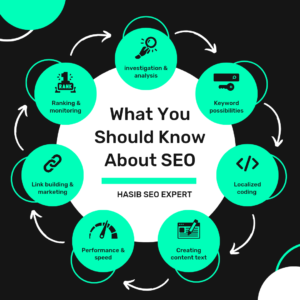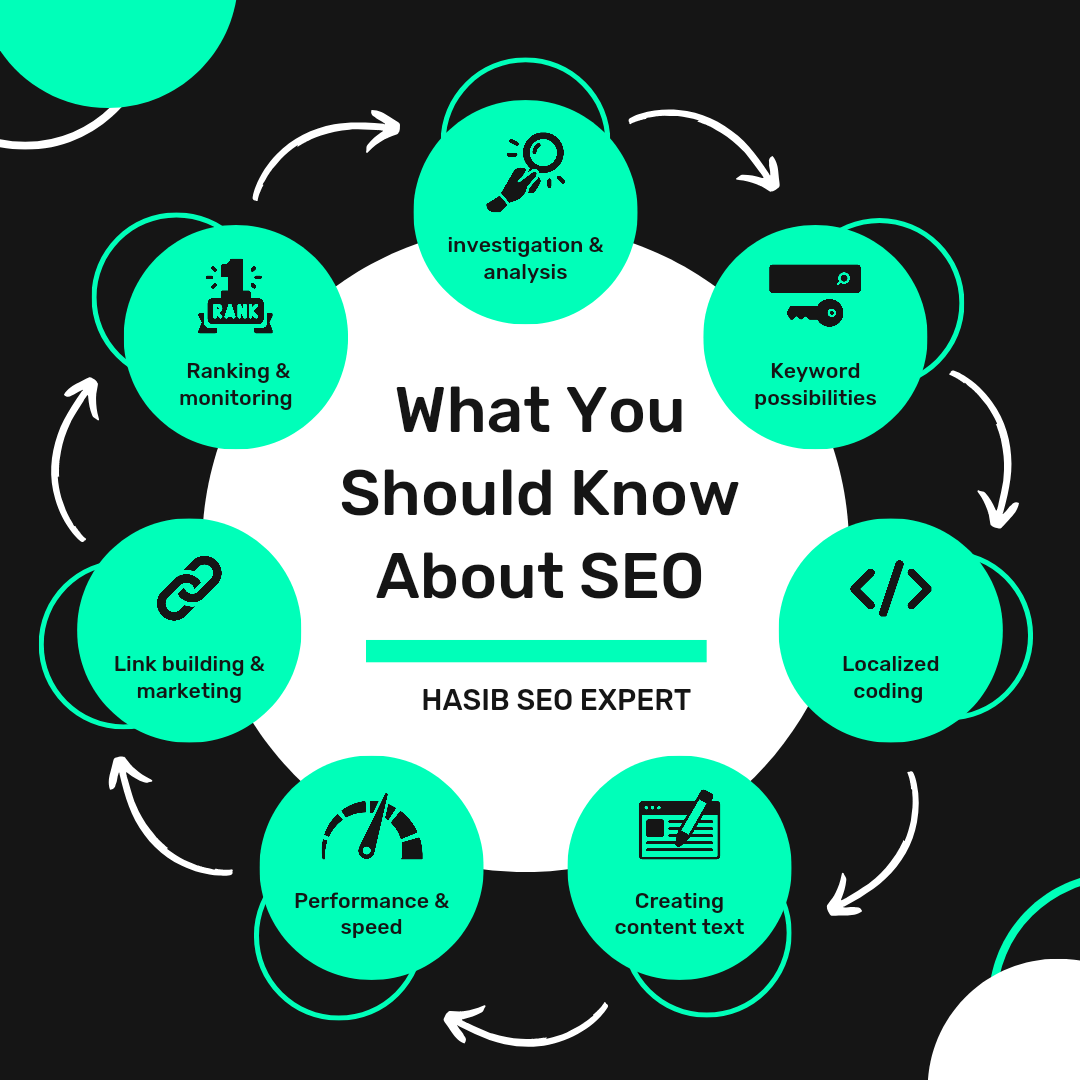What You Should Know About SEO
Search Engine Optimization (SEO) is a fundamental strategy in digital marketing that focuses on improving a website’s visibility in search engine results pages (SERPs). By optimizing content, and structure, and technical elements, SEO can drives organic traffic to a website, increasing its chances of success. Here’s what you need to know and about SEO.
—
1. The Importance of SEO
SEO is vital for businesses, blogs, and websites aiming to reach a larger audience. Given that search engines like Google serve as the primary way users find information online, ranking high on these platforms can mean the difference between a booming site and one that goes unnoticed.
Organic vs. Paid Traffic: SEO focuses on organic (non-paid) traffic, which is often more sustainable and trustworthy than paid advertising. While both have their place, organic rankings are more valuable in the long run.
Visibility and Credibility: Websites that rank higher on search engines are generally perceived as more credible and authoritative. This trust often and leads to higher conversion rates, and with users more likely to purchase, subscribe, or engage_
—
2. How Search Engines Work
Search engines like and Google uses algorithms to rank web pages. These algorithms analyze multiple factors to determine which content is the most relevant to a user’s search query.
Crawling and Indexing: and Search engines use _”bots” to crawl the web and index content. This means they analyze pages, images, and links to categorize and store them in a massive database. If your content isn’t crawled or indexed properly, it won’t appear in the search results.
Ranking Factors: Once your site is indexed, search engines rank it based on hundreds of factors. Some of the most important include keyword relevance, content quality, backlinks, user experience (UX), mobile-friendliness, and website speed.
—
3. On-Page SEO
On-page SEO refers to the optimization you perform directly on your website. It ensures that both search engines and users can understand the content and structure of your site.
Keywords: Keywords are the foundation of SEO. When users type in search queries, search engines match those queries with the content that includes the most relevant keywords. To optimize your site, focus on incorporating primary and secondary keywords naturally in your titles, headings, and body content.
Content Quality: Google places significant emphasis on high-quality content that satisfies the user’s intent. Your content should be informative,and well-researched, _and provide value. Search engines favor comprehensive pieces that answer user queries effectively.
Meta Tags: and These include the title tag, meta description, _and header tags. Meta tags play a crucial role in how search engines understand your pages and how your site appears in the SERPs. A well-crafted meta description can also improve click-through rates.
Internal Linking: Links to other pages on your site help search engines crawl and index your content more efficiently. They alsoand enhance the user experience by providing a logical navigation path.
—
4. Off-Page SEO
Off-page SEO includes activities that take place outside your website but still impact your rankings. The primary focus is on building authority and trustworthiness, usually through backlinks from other websites.
Backlinks: A a backlink_ is a link from another website to yours._ Search engines _see backlinks as a vote of confidence. High-quality, relevant backlinks from authoritative websites can significantly boost your rankings. However, low-quality or spammy backlinks can have the opposite effect.
Social Signals: Although Google has stated that social media activity is not a direct ranking factor, having a strong social presence can amplify your content and lead to more backlinks, improving your SEO efforts indirectly.
Guest Posting: Writing high-quality content for other websites in your industry can help you gain valuable backlinks and establish authority.
—
5. Technical SEO
Technical SEO refers to the optimization of your website’s backend to help search engines crawl and index it more efficiently.
Site Speed: Slow websites lead to poor user experience and can hurt rankings. Google considers page speed as a ranking factor, so it’s crucial to optimize your images, compress files, and use a reliable hosting provider.
Mobile Optimization: With the majority of users accessing the web via mobile devices, Google uses mobile-first indexing, meaning it primarily uses the mobile version of a site for ranking. Ensure your you_website is responsive and works_ seamlessly across all all devices.good
Sitemaps and Robots.txt: A sitemap helps search engines understand the structure of your website and ensure all pages are indexed. Meanwhile, a robots.txt file guides search engines on which pages to crawl and which to ignore.
HTTPS and Security: Secure websites (those with HTTPS) rank better than non-secure ones. Users also trust secure websites more, improving overall engagement.
—
6. SEO Tools
There are many tools and available to help optimize your site. From keyword research to technical audits, SEO tools provide critical insights.
Google Analytics and Search Console: and _These free tools from Google help you track your website’s performance good and identify areas for improvement.good
SEMrush, Ahrefs, and Moz: These paid tools provide advanced insights into your SEO efforts, from backlink profiles to keyword opportunities and site audits.
Yoast SEO: A popular plugin for WordPress, and Yoast SEO helps optimize content for on-page SEO.
—
7. The Evolving Nature of SEO
SEO is not a one-time task and but an ongoing process. Search engine algorithms are constantly evolving, meaning that tactics that worked last year may not work now. Staying and informed about the latest _SEO trends and adapting your strategies accordingly is essential for long-term successfull.
AI and SEO: Artificial intelligence (AI) is playing a more significant role in search. Google’s RankBrain, for example, and uses AI to understand user intent better and deliver and more relevant good results.
—
Conclusion
SEO is a crucial digital marketing strategy that drives organic traffic, builds credibility, and enhances user experience. By understanding the different aspects of SEO—on-page, off-page, and technical—you can optimize your website for better search engine visibility. Keep in mind that SEO requires ongoing effort and adaptation to changing trends and algorithms, but the rewards of a well-optimized site can be immense.
Hasib SEO Expert

Search Engine Optimization (SEO) is a fundamental strategy in digital marketing that focuses on improving a website’s visibility in search engine results pages (SERPs). By optimizing content, and structure, and technical elements, SEO



Leave a Reply